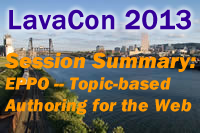LavaCon Session Summary: Content Creation Track
Presenter: Mark Baker, Analecta Communications / Every Page is Page One
 Mark Baker writes a popular blog named the same as his session and new book, Every Page is Page One. Mark’s position is that any page or topic on the web or in Internet help content could be the first one that a user sees. Therefore, each topic must stand alone and provide enough context to be understandable without reading any other topic. Creating these “EPPO” topics takes a shift in thinking for many writers.
Mark Baker writes a popular blog named the same as his session and new book, Every Page is Page One. Mark’s position is that any page or topic on the web or in Internet help content could be the first one that a user sees. Therefore, each topic must stand alone and provide enough context to be understandable without reading any other topic. Creating these “EPPO” topics takes a shift in thinking for many writers.
People jump around when researching help and how-to information and don’t read linearly. Mark cites John Carroll’s The Nurnberg Funnel to support that this behavior was the norm well before the web existed. Users look for information to fulfill a goal or complete a task, not to read a book from cover to cover. It is impossible to predict which sequence folks will read in, so materials must be designed to be read in any order.
Now that we have the web, people read in a prescribed order even less. People like to search the web because it isn’t like searching the index of a book, rather it is like searching all books ever written. And since manuals can’t cover every single potential issue a user could have, and users sometimesneed information from areas of low demand, which are not included in manuals.
Mark likens the fickle nature of how people hunt for information to the behavior of wild animals. He points to the issues raised in Jakob Nielsen’s article on Information foraging: the easier it is to find new information, the less time a user will spend searching for information in any one place. Without an immediate return on investment, the user feels it is more fruitful to move on to a promising information source.
Everyone makes their own way through information. If the information they find doesn’t have the right “information scent,” they move on. We don’t provide door-to-door service any more, like we did with manuals in chapter format. Rather, we provide pieces of the journey for them, assuming a self-guided rather than guided tour.
Mark outlined the characteristics of EPPO Topics:
Self-Contained: never assume that a reader has read any related help topic, but can assume that the reader has some relevant knowledge of the subject.
Establish Context: the reader may arrive from anywhere, so help readers to get their bearings quickly.
Specific and Limited Purpose: each topic should have one purpose and only that purpose.
Conform to a Type: topics on a similar subject tend to have a similar pattern, such as the following examples:
- Recipe – Black Forest Hama and Gruyere Frittata
- Subaru review
- Creating REST applications with the Slim micro-framework
- Wikipedia – Ottawa
- Topics support readers choosing their own path – readers decide when they want big picture or gritty detail, and change levels by changing topics.
- Topics stay on the same level.
I have been following Mark’s blog for several years and I am in complete agreement with him on the necessity of switching gears from writing help manuals to providing content that matches the web experience. But staying on one level is challenging, so I’m hoping he’ll provide some thoroughly dissected examples of well-done EPPO topics in a future post, so we can learn and apply that secret sauce.